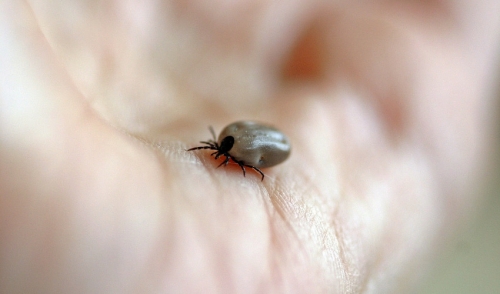
6 Ways to Keep Ticks Out of Your Yard Naturally
Ticks are more than just annoying, biting insects. They can also transmit a number of scary diseases, including lyme disease, Rocky Mountain spotted fever, human anaplasmosis, tularemia, rickettsiosis and more. Even scarier than tick-borne diseases with their different complications and expensive medical treatments, however, is the overuse of toxic chemicals that may be used incorrectly or irresponsibly to repel ticks. Those same chemicals, when used improperly, could lead to completely different reactions and complications for both humans and pets that may have chemical sensitivities. Fortunately, there are several natural remedies to scare off ticks without the risks associated with chemical use.
Keeping Ticks Away
There are a number of different ways that can help keep ticks away, and the further these bugs are from you and your pets, the better the results. After all, there is no risk of tick bites if ticks are nowhere around. Effective ways to scare off ticks include…
- Using Plants That Repel Ticks
Different landscaping plants have tick-repellent properties, with fragrances, textures and oils that these bugs cannot tolerate. Garlic, sage, mint, lavender, beautyberry, rosemary and marigolds are some of the most familiar and effective tick-repelling plants, and they are great to use in landscaping borders around decks, walkways, pet runs, patios and other areas to keep ticks away. These plants can also be used in containers near windows and doors to discourage ticks.
- Discourage Tick-Carrying Wildlife
Deer and mice are the most common wildlife that carry ticks, and taking steps to discourage these visitors is an easy way to keep ticks away as well. Chose plants that deer won't eat, use fences to keep wildlife away, clean up trash so it does not attract mice, clean underneath bird feeders so there is no food available and use humane, responsible traps and other deterrents as needed to remove these tick transporters from your yard.
- Destroy Tick Habitat
While you may want to design landscaping that is friendly for birds, butterflies or other welcome wildlife, you can also design that same landscaping to get rid of ticks. These insects thrive in moist, shaded areas, so remove brush piles, overgrown plants and long grasses that are ideal for ticks. Proper pruning and keeping grass mowed will keep ticks from getting too comfortable. Using cedar chips for mulch can also discourage ticks because the oils in cedar are naturally tick-repellent.
- Welcome Tick-Eating Wildlife
If you enjoy having wildlife and animals in your yard but don't want ticks to be part of the menagerie, opt for wildlife that happily eats ticks. Wild birds eat a great number of insects, especially jays, robins and bluebirds. Domestic chickens and similar fowl, including ducks, geese, turkeys and guineafowl, also eat ticks and can help keep your yard and garden tick-free.
- Make Yourself Less Tick-Friendly
There are changes you can make to your diet to discourage ticks. A diet high in garlic, onions and sources of vitamin B1 (thiamin), such as tuna, tomatoes, sunflower seeds, asparagus and leafy greens, for example, can alter your body chemistry in a way that ticks don't appreciate, so they aren't as likely to bite. Wearing loose clothing that covers all your skin can also help keep ticks from attaching, and light colors will make ticks easy to spot so you can quickly remove them.
- Try a Tick Repellent
Natural essential oils from rosemary, cedar, lemongrass, peppermint, citronella and geranium are believed to be particularly noxious to ticks, and homemade repellent recipes frequently incorporate these oils into lotions or sprays to repel ticks. Depending on the recipe, the repellent may be applied to skin, fabric or even plants, doorways or other areas, keeping ticks away.
While any of these methods can be effective at scaring off ticks, it is always best to use multiple techniques for the strongest protection against these unwanted insects. By using several tactics to discourage ticks, you can easily make sure these bugs are never bothersome again.
